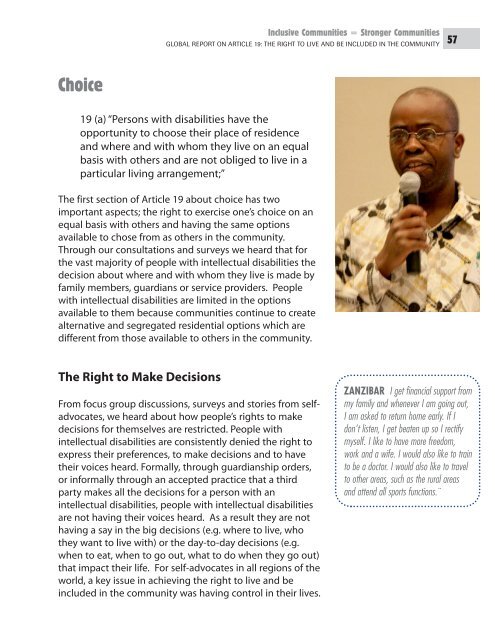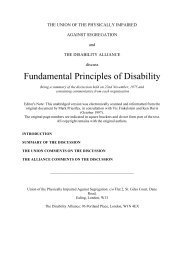Global-Report-Living-Colour-dr2-2
Global-Report-Living-Colour-dr2-2
Global-Report-Living-Colour-dr2-2
You also want an ePaper? Increase the reach of your titles
YUMPU automatically turns print PDFs into web optimized ePapers that Google loves.
Inclusive Communities = Stronger Communities<br />
GLOBAL REPORT ON ARTICLE 19: THE RIGHT TO LIVE AND BE INCLUDED IN THE COMMUNITY<br />
57<br />
Choice<br />
19 (a) “Persons with disabilities have the<br />
opportunity to choose their place of residence<br />
and where and with whom they live on an equal<br />
basis with others and are not obliged to live in a<br />
particular living arrangement;”<br />
The first section of Article 19 about choice has two<br />
important aspects; the right to exercise one’s choice on an<br />
equal basis with others and having the same options<br />
available to chose from as others in the community.<br />
Through our consultations and surveys we heard that for<br />
the vast majority of people with intellectual disabilities the<br />
decision about where and with whom they live is made by<br />
family members, guardians or service providers. People<br />
with intellectual disabilities are limited in the options<br />
available to them because communities continue to create<br />
alternative and segregated residential options which are<br />
different from those available to others in the community.<br />
The Right to Make Decisions<br />
From focus group discussions, surveys and stories from selfadvocates,<br />
we heard about how people’s rights to make<br />
decisions for themselves are restricted. People with<br />
intellectual disabilities are consistently denied the right to<br />
express their preferences, to make decisions and to have<br />
their voices heard. Formally, through guardianship orders,<br />
or informally through an accepted practice that a third<br />
party makes all the decisions for a person with an<br />
intellectual disabilities, people with intellectual disabilities<br />
are not having their voices heard. As a result they are not<br />
having a say in the big decisions (e.g. where to live, who<br />
they want to live with) or the day-to-day decisions (e.g.<br />
when to eat, when to go out, what to do when they go out)<br />
that impact their life. For self-advocates in all regions of the<br />
world, a key issue in achieving the right to live and be<br />
included in the community was having control in their lives.<br />
ZANZIBAR I get financial support from<br />
my family and whenever I am going out,<br />
I am asked to return home early. If I<br />
don’t listen, I get beaten up so I rectify<br />
myself. I like to have more freedom,<br />
work and a wife. I would also like to train<br />
to be a doctor. I would also like to travel<br />
to other areas, such as the rural areas<br />
and attend all sports functions.¨



